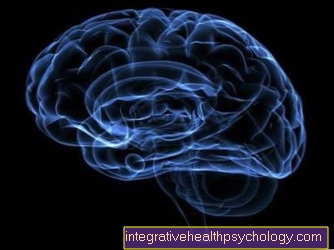What are the consequences of anorexia?
introduction
People with anorexia are at high risk of causing permanent damage to their body and mind due to the lack of nutrients and the psychological impairments of their illness. This risk increases the longer the anorexia is left untreated. Many of these sequelae are visible when they affect physical appearance, whereas the psychological effects of anorexia go undetected for a long time.
Are you looking for general information about anorexia? Then we recommend our topic:
- anorexia
- How is anorexia treated?

The organic consequences of anorexia
Hair loss from anorexia
Hair loss is a common symptom of anorexia caused by long-term deficiency in essential nutrients.
Although this is more of a cosmetic problem, it puts a lot of strain on those affected.
The skin and nails also suffer from a lack of vitamins and trace elements.
The reason for this is the constant renewal of these cells, which requires a lot of energy and special nutrients. In the absence of these building materials, the scalp hair thins and eventually falls out, the skin becomes pale and thin, and the nails become brittle.
Those affected look sickly and are increasingly asked about their unhealthy appearance. Often they first bring these aesthetic problems to the doctor.
Fortunately, in most cases, hair loss is reversible if adequate nutrition is restored.
Then the hair grows back and the skin and nails recover. Food supplements can be used to accelerate regeneration.
The absence of a menstrual period
Most of the patients with anorexia are women. In addition to hair loss and other aesthetic consequences of their disease, they also suffer from irregularities in their menstrual cycle. Because if the female body loses too much fat, hormone production drops drastically. This is due on the one hand to the “energy-saving mode”, which the body is put into and in which the most vital organs are tolerably supplied, and on the other hand to the loss of the fat cells themselves, which, like the ovaries, can produce estrogen. Those affected therefore have a deficiency in female sex hormones, which can no longer adequately regulate the cycle.
There are menstrual disorders, ovulation does not occur and the woman has no menstrual period. Consequently, she cannot get pregnant either. The absence of a menstrual period and the resulting infertility is a protective mechanism of the body so that the woman in this physically weakened state is not burdened by pregnancy. If the malnutrition persists for too long, the hormonal cycle can remain permanently impaired and in the worst case lead to persistent infertility. Some women therefore have to rely on the help of specialists in order to become pregnant after a long-standing anorexia illness.
Further information on this topic can be found at: Menstrual irregularities
Constipation due to anorexia
Constipation is also often found as a side effect of anorexia. Because the intestine only works properly when it is full, which is mainly due to fiber. If there is no stimulus due to insufficient food intake, the intestine becomes sluggish and hardly moves. The small amounts of stool often remain in the gastrointestinal tract for days, which can be accompanied by pain and a bloated stomach. This can also be visually disruptive.
Frequent freezing
The frequent freezing in anorexic patients is not due to a lack of insulation by body fat, as one would initially assume. The metabolism, which is shut down due to the lack of nutrients, is to blame. The body is, so to speak, in "energy saving mode" and the temperature regulation is disturbed. taining the body temperature costs energy that is simply not available in anorexia. The heat is limited to the vital internal organs, which is why the rest of the body quickly becomes hypothermic and those affected easily freeze.
Can anorexia promote osteoporosis?
The bones are also subject to constant build-up and breakdown in order to adapt to the stress caused by the body. To do this, they primarily need calcium and vitamin D, which must be taken in with food. In women, the production of estrogen also plays an important role, which inhibits the breakdown of the bone and stimulates its build-up. In anorexia, on the one hand, too few nutrients are absorbed and, on the other hand, significantly fewer hormones are produced, which is why the risk of osteoporosis increases in women in particular. Bone fractures and deformations are the result.
Read more about Osteoporosis in underweight.
How does the complexion change with anorexia?
The cells of the skin, like hair and nails, are subject to a constant regeneration cycle in order to protect the body from the environment. This requires various nutrients and energy that are not available in sufficient quantities in the case of anorexia. Vitamin B12, folic acid and iron, which are essential for the regeneration of all cells, are particularly important in this context.
If these substances are deficient, the skin becomes dry, flaky and pale, wounds only heal very slowly and the dwindling elasticity makes the skin look significantly older. Due to the breakdown of the subcutaneous fat, veins and tendons appear more prominent and the skin has a bluish shimmer in some areas.
So-called lanugo hairs, a remnant of embryonic development, can also appear in areas that have become particularly thin. It sits like a fluff on the skin of the fetus, is supposed to protect it from heat and cold and can reappear in anorexic people. If the person concerned gains weight again and receives all the important nutrients, the damage usually recedes.
The effects of anorexia on brain performance
The brain is the most important organ in our body and is therefore best supplied. However, it is dependent on a sufficient supply of carbohydrates, as it cannot fall back on body fat for energy production. If the necessary supply of carbohydrates is not available over a longer period of time, the metabolic processes and thus the efficiency of the brain decrease and cognitive limitations such as concentration problems arise.
In addition, persistent anorexia leads to the breakdown of nerve cells and a shrinkage of the brain. In adults, this damage is at least partially reduced as soon as an adequate supply of nutrients is guaranteed again. However, if the disease affects children and adolescents whose brain development has not yet been completed, some areas of the brain can remain permanently impaired. Above all, the amygdala as the central interconnection of emotions and the hippocampus as an integration point for memory and learning are affected. The result is a high susceptibility to depression and other psychiatric illnesses.
The effects on the kidney
In order for the kidneys to work properly, they need a constant supply of electrolytes such as sodium, potassium, and other charged particles (ions). This allows the kidneys to concentrate urine and remove harmful substances. If these electrolytes are missing, kidney function is restricted, water is stored in the tissue and pollutants such as uric acid are only inefficiently excreted. The resulting high uric acid level damages the kidney tissue and can be deposited in the form of crystals in joints, which leads to pain similar to gout.
In addition, hormones are produced in the kidneys, which are important for bone metabolism and blood formation and are consequently reduced in anorexic people. Damage to the kidney can lead to bone problems and anemia. Unfortunately, the kidneys are very sensitive organs that often no longer regenerate completely. Anorexia often results in chronic kidney failure.
The adrenal glands, small organs attached to the kidneys that produce vital hormones such as cortisol, are also damaged by the inadequate supply of nutrients. After many years of anorexia, patients can therefore be dependent on taking these hormones if their own body no longer produces them in sufficient quantities.
Is cardiac output impaired due to anorexia?
If the body switches to the back burner due to a lack of nutrients, the heartbeat slows down and blood pressure drops. As a result, those affected are quickly tired, barely productive and run out of breath even with the slightest exertion. In addition, the electrolyte disorders already described not only affect the kidneys, but also the heart. The individual heart muscle cells depend on a balanced electrolyte concentration in order to be properly activated and to contract at the same time. In the event of an electrolyte imbalance, the heart cannot beat properly and cardiac arrhythmias occur, which can be potentially life-threatening.
So-called pericardial effusion, i.e. an accumulation of fluid in the connective tissue around the heart, occurs more frequently in anorexic people. This is painful and can constrict the heart. If the eating disorder persists for a longer period of time, such damage to the heart often remains more or less pronounced, even if the affected person eats normally again.
Consequences for the gastrointestinal tract
The gastrointestinal tract suffers from the disease depending on the form of anorexia and the method of weight loss. The upper portions, e.g. The esophagus is damaged, especially in the case of forced vomiting in the context of bulimia, as the acid from the stomach attacks the mucous membrane. The result is inflammation, some of which heal with scarring and leave constrictions behind. These can cause problems again and again in the course of life. In addition, the constant damage can cause the mucous membrane cells to degenerate, i.e. develop malignant tumors.
They suffer bulimia? Find out more about this.
The lower parts of the gastrointestinal tract, i.e. the small and large intestines, are damaged by the fact that the cells cannot regenerate properly due to the lack of nutrients, there is no stimulus from the passage of the food supplied and the sensitive intestinal flora is disturbed. This leads to digestive problems and constipation, which can be very painful and distressing for the patient. The sensitive milieu of the intestinal flora in particular regenerates slowly, which is why problems in the gastrointestinal tract can persist for some time after therapy.
Read more on the topic: Nasogastric tube
The psychological consequences of anorexia
What are the psychological consequences of anorexia?
Anorexia is basically a mental illness. It is particularly common in people of ambitious and performance-oriented character, who suffer from low self-esteem and for whom anorexia is a kind of feeling of power. The food restriction gives those affected to a certain extent control over their body that others do not have, and thus sets them apart from the crowd from their point of view.
In addition, the brain reacts (at least initially) with an increase in performance. This mechanism is intended to help us survive the lean times ahead, and is based, among other things, on the release of dopamine, which plays a central role in the development of addiction. At the onset of anorexia, the person feels very good, downright intoxicated, and is encouraged in their actions by biological mechanisms. These processes confirm those affected in their assumption that they are only worth something if they maintain the anorexia.
Over time, therefore, there is a lot of psychological stress due to the increasing pressure and physical decline. Depression, in particular, is common in anorexic patients. But also biologically the brain suffers from insufficient supply and degrades, which leads to a loss of concentration and performance and changes in personality. The psychological consequences of anorexia are therefore usually more serious than the physical.
The effects on libido
Loss of libido is another typical consequence of malnutrition. In women, this is due, among other things, to the hormonal imbalance, which prevents ovulation and the associated increase in libido. In men, there is a loss of potency due to hormonal dysregulation. The psyche is also an important factor, as patients usually feel uncomfortable and unattractive in their bodies. In addition, the physical weakness as a direct consequence of the insufficient supply makes sexual intercourse more difficult.
What are the consequences of anorexia for the workplace?
Anorexia often has a positive effect on the performance of the person concerned, at least initially, especially at school or at work.
However, this initial increase in performance disappears after a few weeks of insufficient nutrient supply and the body and brain can no longer work properly. Concentration difficulties, memory gaps and carelessness errors are the result.
But accompanying psychological problems can also become noticeable, for example depression or conflicts with colleagues. Those affected are under enormous pressure, especially if they want to keep their illness a secret at work.
In the long run, this condition is unsustainable and severe anorexia often leads to disability.
People in professions where appearance or physical fitness are of elementary importance are particularly at risk, e.g. in the fashion industry or among athletes. In such a workplace, the disease can go undetected for a long time.





























